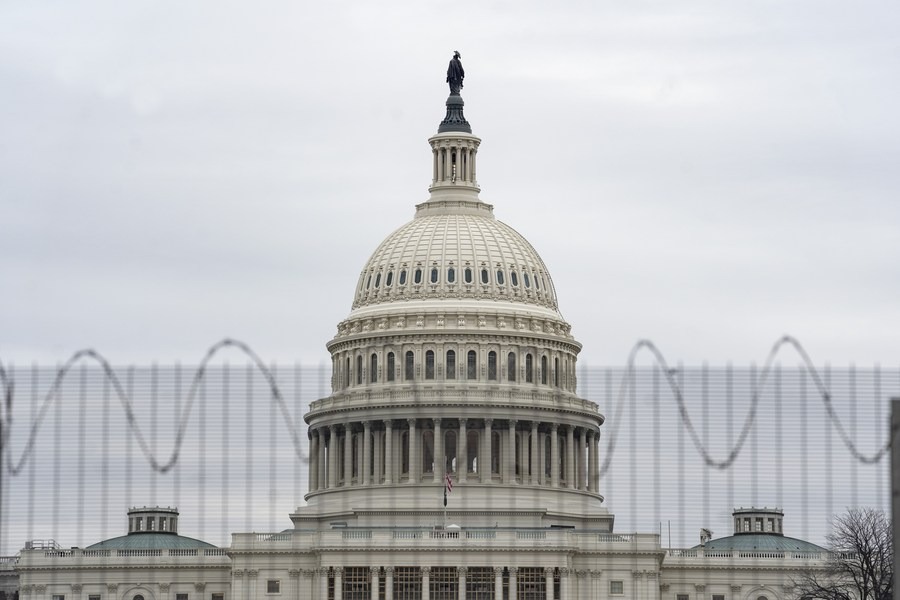Paying the price for others


Africa's ability to manage climate challenges will remain weak unless the funding gap is addressed
Despite Africa, the continent with the most developing countries, contributing the least to global warming — accounting for less than 4 percent of the world's greenhouse gas emissions — nearly all countries across the continent disproportionately face exponential secondary and derivative disasters caused by frequent natural catastrophes resulted from climate change. This severely impacts their economy, stability and peoples' livelihoods, while challenging the continent's modest development gains and pushing people back into extreme poverty.
Africa is the most vulnerable continent on the "highway to climate hell" under all climate scenarios above 1.5 degrees Celsius, since most African countries are yet to find a credible pathway to convert their commitments under Nationally Determined Contributions to the Paris Agreement at the United Nations Climate Change Conference in 2015 (COP 15) into a climate-resilient and smart growth dynamic.
Africa's trauma and developed countries' sluggish delivery of their promises in terms of climate financing, technology transfer and capacity building highlight the urgent need to further improve the West-proposed climate governance paradigm so there is more consideration for the developing world, including Africa.
The push for more finance to support Africa's climate change mitigation through natural disaster prevention and relief rather than carbon emissions reduction is the pressing focus of the continent's engagement in the global climate arena. While the 27th United Nations Climate Change Conference held in Sharm el-Sheikh, Egypt, discussed projected CO2 emissions of 37.5 billion tonnes this year, a new record, the continent closest to carbon neutrality is actually paying the most miserable price for the world's CO2 reduction plan being well behind schedule.
Even in 2022, the harsh drought in the Horn of Africa, the deadly Cyclone Ana in Malawi and the devastating floods in Nigeria and South Africa, displaced millions of people and caused social unrest, further highlighting the correlation between global warming and the stability deficit which was already exacerbated by the COVID-19 pandemic and soaring food prices. A research report recently published by the UK relief agency Christian Aid indicates that with eight of the 10 most vulnerable countries being in Africa, by 2050 the continent may lose 20 percent of its GDP to devastation caused by extreme weather. Although Africa has emphasized that the historical polluters of the developed world should pay the debt of this huge imposed damage and it has called on the West to provide a 10-fold increase in climate financing, according to the US think tank Climate Policy Initiative, only $30 billion a year on average has actually been released to Africa over the past decade.
Evidently, the prospect of Africa's ability to manage climate challenges will remain bleak unless the growing huge funding gap is properly tackled.
Regarding climate change adaptation, synchronizing plans on energy structure transformation with efforts to overcome the power deficit through technological and talent support would be Africa's fulcrum. Except South Africa, which needs to decrease its existing large scale coal-powered electricity production, carbon peaking and carbon neutrality for most African countries with almost negligible carbon emissions call for the direct substitution of renewable energy for fossil fuels in their envisaged modernization blueprint. However, this will give rise to a paradox between the current and potential economic dividend of huge reserves of unexploited fossil fuels across the continent with African countries' urgent need to satisfy their peoples' power thirst.
Taking Nigeria, Africa's largest economy, as an example, the soaring international energy price has brought it an additional $25 billion from its exports of crude oils in the first half of 2022, a year-on-year increase of 83 percent. Reducing the country's oil exports, which now account for 79 percent of the country's total exports, would mean eroding the Nigerian government's capability to modernize its national grid due to the shrinkage of its oil-based foreign exchange. Meanwhile, the prospect of filling the huge power gap is still bleak if the stable procurement of renewable energy is not feasible in the near future.
A World Bank study shows that in 2022 the electricity access rate in Africa has been a meager 40 percent, which means more than 640 million Africans still live in darkness at night. Considering the rigid power demand brought by the world's highest population growth rate of 2.7 percent, Africa needs more international cooperation to embrace reliable renewable energy at competitive cost if the continent is to be persuaded to totally detach its energy security concerns from fossil fuels. A McKinsey report in 2015 showed that Africa possesses a potential renewable capacity of 10 TW, but data from the International Renewable Energy Agency indicate that as of 2022 only 26 GW renewable power capacity, or 0.2 percent of this energy endowment, has been exploited in the past decade.
Aside from solar photovoltaic, wind and hydro power, the cost competitiveness of geothermal, bio-energy, and tidal-power is still weak due to insufficient technology transfer and capacity building.
By making full use of the home advantage, the African Group of Negotiators and Draft Africa Climate Change Strategy 2020-2030 are striving to make a breakthrough at the COP 27, while some promising achievements such as the launch of the Africa Carbon Markets Initiative have been made.
The African Union's accession to the G20 would be another step forward for Africa to engage in global climate governance alongside multilateral cooperation led by the United Nations. By consolidating the AU's representation of Africa's common position, the continent as a whole will have direct contact with the main stakeholders of the global climate agenda, including the traditional carbon emitters of the West, emerging economies with the fastest growing carbon contribution such as India, and countries with successful implementation of carbon reduction such as China, and more room to let Africa's voice be heard. With this new framework, Africa is expected to gradually evolve from being a victim of climate change to a promoter and beneficiary of global climate justice.
The author is deputy director of the Security Studies Division at the China-Africa Institute. The author contributed this article to China Watch, a think tank powered by China Daily.
Contact the editor at editor@chinawatch.cn


































